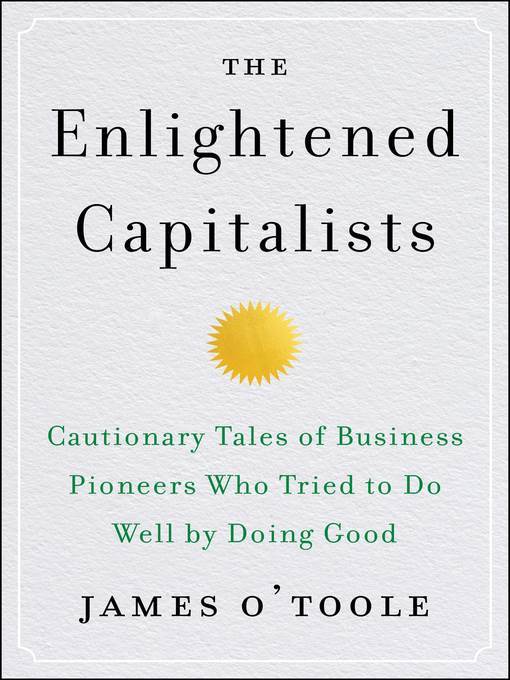
The Enlightened Capitalists
Cautionary Tales of Business Pioneers Who Tried to Do Well by Doing Good
کتاب های مرتبط
- اطلاعات
- نقد و بررسی
- دیدگاه کاربران
نقد و بررسی

December 15, 2018
A history and analysis of "enlightened capitalists [who] sought to address social problems primarily through their business practices, rather than by acts of charity or philanthropy."With the exception of the relatively recent rise of movements like corporate social responsibility, the divide between corporate ambition and philanthropic efforts has been relatively stark. O'Toole (Emeritus, Business/Univ. of Southern California; Creating the Good Life: Applying Aristotle's Wisdom to Find Meaning and Happiness, 2005, etc.), founding director of the Neely Center for Ethical Leadership and Decision Making, gives background and context to the efforts of those who have attempted to challenge one of business's oldest axioms that it is "hard to be good." These enlightened capitalists, writes the author, are notable for their strong ethical compasses, respect for other people, and commitment to sticking to their values through good times and bad. The more familiar characters include James Cash Penney, who created a retail empire that's barely holding on today; and Levi Strauss, whose company has "a jaw-dropping capacity to undertake a corporate volte-face in company policy and strategic direction." In the second half of the book, O'Toole narrates more modern stories--e.g., the epic battles between William C. Norris and Seymour Cray to create the supercomputer; business mavericks like Herb Kelleher of Southwest Airlines and Bill Gore, who coined the term "unmanagement"; and environmentalists like Anita Lucia Perella Roddick, who genuinely tried to change the culture with her Body Shop chain of natural products. Looking forward, the author examines how some business leaders are changing their tunes on environmental and social challenges, integrating ethical considerations into corporate strategy and using social engagement with customers to gain a competitive advantage. O'Toole writes that his method in performing this social review is simple storytelling, and it works; the book serves as an informative road map for leaders who dare to break the mold.A tapestry of remarkable characters, high drama, and entertaining story arcs for leaders of businesses large and small.
COPYRIGHT(2018) Kirkus Reviews, ALL RIGHTS RESERVED.

March 1, 2019
O'Toole (emeritus, Univ. of Southern California Marshall Sch. of Business; Creating the Good Life) details several British and American companies that adopted "enlightened" policies regarding the environment, treatment of employees and customers, or relations with the communities in which they are embedded. As a result, this book draws conclusions from the experiences of a specific set of companies. While the author clearly is sympathetic to these enlightened capitalists, criticisms of these leaders are also taken into account. One of the conclusions is that corporate social responsibility adds complexity and difficulty to a manager or director's job responsibilities. The author notes that it can also be seen as in conflict with the overriding goal of a company's management: stock price maximization. This leads to a second conclusion that, because shareholders tend to be solely fixated on short-term performance regarding the stock price, companies with publicly traded stock are inhospitable to enlightened leadership, which often results in long-term projects not immediately beneficial to the company itself. VERDICT This accessible, informative work should appeal to readers interested in learning more about corporate social responsibility.--Shmuel Ben-Gad, Gelman Lib., George Washington Univ., Washington, DC
Copyright 2019 Library Journal, LLC Used with permission.

























دیدگاه کاربران